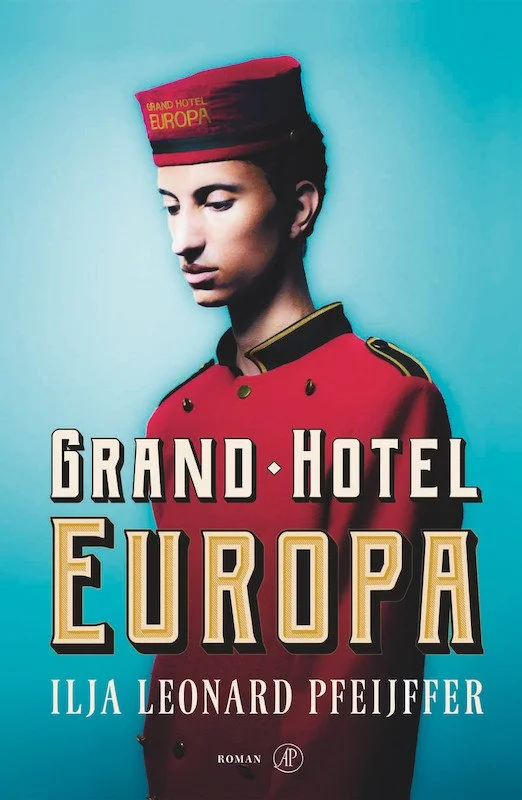Book Review - Grand Hotel Europa - Ilja Leonard Pfeijffer
This was an unusual book. It’s fiction, but the Ilja in the book is also the author, and whilst there is a plot of sorts, it’s also well researched and contains statistics so feels like a non fiction book at times. It’s also very long and whilst my description may make it seem a bit dry, it’s also very readable and entertaining at times.
The grand hotel europa of the title is a metaphor for Europe, with it’s old faded glamour, coming apart at the seams and merely existing on its past glories. It has turned into a bit of a living museum for tourists but needs to be saved by a Chinese businessmen. Those working at the hotel include Abdul, a migrant working as a bellboy, building a new life, whilst Mr Montobello, the major domo, wants to maintain the old ways but it’s no longer working. The old Europa has to change. As a metaphor, it felt a bit heavy handed, but it’s also a memorable setting.
Like I said earlier, what was a bit confusing to begin with is that the protagonist in the book is also the author, who has retired to the hotel to write about his past relationship with a fiery Italian called Clio, and there is a bit of a plot in which they are searching for a lost Caravaggio. These parts offered a bit of light relief, and there’s one monumental argument that is very funny. I certainly wouldn't want to get on the wrong side of Clio.
It does have quite an ironic tone and a nice rhythm to it. I never got bored of it, I just felt that I some of the themes were crowbarred in. It took me a while to get through this one, as it’s quite a long book, weighing in at 560 pages. But that’s certainly not to say that it was a total slogfest - lots of it is very entrertaining and it definitely explores some interesting ideas.
Tourism
‘Grand hotel Europa’ certainly made me think a lot about tourism and the effects it has on the life of inhabitants. Some of the statistics showed the devastation. Venice features in the book, deluged as it is by 18 million tourists a year (50,000 a day) and if its rate of population decline continues, it will be empty by 2030. The author talks about how he could buy Chinese made carnival masks on every street corner, but nothing such as washing up liquid or fresh tomatoes for those who lived there. A city loses part of its soul when it gives itself up completely to tourism, as any visitors to Dublin recently will also tell you, with it’s airbnbs owned by rental and real estate companies.
Europe has become an open air museum, a fantastic historical park for tourists.
I have been a tourist and of course I have thought of the impact tourism have. I realised this when I visited Barcelona and became aware of the fight to make the city centre a place for people to live in again, rather than existing to merely serve tourism. At the same time, there’s a reliance on the income from tourists as the traditional industries decline, but is that the best employment that residents can look forward to - to merely sell trinkets to tourists? There’s definitely a balance to be found, but it seems very lopsided at present. But when a continent trades itself on it’s past, what else has it got to sell?
‘Europe is drowning in it’s own history. There is so much past in Europe that there’s no space left for the future.’
Populism
The book is also interesting when it comes to the growth of right wing populism and the nostalgia for a better time that never actually existed (Hello Brexit Britain), closing it’s borders, bringing back imperial measurements and hanging out the flags. Utterly depressing.
It also made me laugh when Ilja talked of not being a tourist and going to other places that were off the beaten track and being annoyed when other tourists are also there, tourists who had also decided that they too weren’t like the normal tourists and wanted to go off the beaten track. What’s apparent, is that there is nowhere that hasn’t been tainted by tourism and it’s silly to think otherwise.
It also has some interesting points to make about migration, and how poverty is just as deadly as war. People have been migrating since we’ve been able to stand upright, and we populated two continents from our beginnings in Africa. One of the most optimistic ideas in the book is that Europe can become revitalised by channeling the stream of migrants to it’s advantage, as it has an ageing population, and can use some youthful vigour.
The hotel contains a number of different characters, all representative of a different type. There’s a bolshy female French poet, the brash American tourists, an old Greek man and the eminent scholar Patelski, who in conversation with Ilja made me pause to consider the point of travel.
Travel
Travel is often a way of running away from yourself. Sure, there is the pleasure you get from the feeling of displacement, of being in a different environment. But you can’t escape yourself. And it’s quite egotistical as well, achieving our sense of individual freedom and damn the consequences. Maybe it would be better to close our eyes and spend some time alone with ourselves in a room and and then improve the lives of those around us, rather than running off to distant corners of the planet. And a couple of broken interactions with a local isn’t a meaningful exchange.
One of the questions asked is ‘does travel really broaden your mind?’ I’ve met so many people who treat travel like some tick box exercise, who consider it vital that they have to visit fifty countries before they turn fifty etc. Really? Some of the least interesting people I’ve met have been those who’ve travelled the most. Listening to someone drone on about their holiday experiences for hours on end is a bit like listening to someone recount their dreams in detail - you really had to be there. Like I say, this is a book that asks some interesting questions. I should say that I do like travel myself, and I do value experiences - I just think they can be personal to the individual which can make them sound self absorbed.
All in all, writing this review made me realise this was a much better book than I initially thought. That happens some times with me; I’m so relieved to finish a book when it’s over 500 pages that it’s only when I sit down to gather my thoughts that I realise it was an interesting read. I do think ‘Grand Hotel Europa’ would have worked better if it had been shorter, but nevertheless, pretty readable and lots to think about.
Grand hotel Europe by Ilja Leonard Pfeijjffer
Thanks to Netgalley and 4th estate for the Advanced Reader Copy.
560 Pages 4th estate
14th of April 2022


